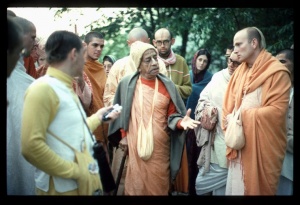SB 9.8.12: Difference between revisions
(Vanibot #0018 edit: make synonym terms in Sanskrit italic in SB - Vanisource) |
(Vanibot #0054 edit - transform synonyms into clickable links, which search similar occurrences) |
||
| Line 23: | Line 23: | ||
<div class="synonyms"> | <div class="synonyms"> | ||
''na'' | ''[//vanipedia.org/wiki/Special:VaniSearch?s=na&tab=syno_o&ds=1 na]'' — not; ''[//vanipedia.org/wiki/Special:VaniSearch?s=sādhu&tab=syno_o&ds=1 sādhu]-[//vanipedia.org/wiki/Special:VaniSearch?s=vādaḥ&tab=syno_o&ds=1 vādaḥ]'' — the opinion of learned persons; ''[//vanipedia.org/wiki/Special:VaniSearch?s=muni&tab=syno_o&ds=1 muni]-[//vanipedia.org/wiki/Special:VaniSearch?s=kopa&tab=syno_o&ds=1 kopa]'' — by the anger of Kapila Muni; ''[//vanipedia.org/wiki/Special:VaniSearch?s=bharjitāḥ&tab=syno_o&ds=1 bharjitāḥ]'' — were burned to ashes; ''[//vanipedia.org/wiki/Special:VaniSearch?s=nṛpendra&tab=syno_o&ds=1 nṛpendra]-[//vanipedia.org/wiki/Special:VaniSearch?s=putrāḥ&tab=syno_o&ds=1 putrāḥ]'' — all the sons of Sagara Mahārāja; ''[//vanipedia.org/wiki/Special:VaniSearch?s=iti&tab=syno_o&ds=1 iti]'' — thus; ''[//vanipedia.org/wiki/Special:VaniSearch?s=sattva&tab=syno_o&ds=1 sattva]-[//vanipedia.org/wiki/Special:VaniSearch?s=dhāmani&tab=syno_o&ds=1 dhāmani]'' — in Kapila Muni, in whom the mode of goodness was predominant; ''[//vanipedia.org/wiki/Special:VaniSearch?s=katham&tab=syno_o&ds=1 katham]'' — how; ''[//vanipedia.org/wiki/Special:VaniSearch?s=tamaḥ&tab=syno_o&ds=1 tamaḥ]'' — the mode of ignorance; ''[//vanipedia.org/wiki/Special:VaniSearch?s=roṣa&tab=syno_o&ds=1 roṣa]-[//vanipedia.org/wiki/Special:VaniSearch?s=mayam&tab=syno_o&ds=1 mayam]'' — manifested in the form of anger; ''[//vanipedia.org/wiki/Special:VaniSearch?s=vibhāvyate&tab=syno_o&ds=1 vibhāvyate]'' — can be manifested; ''[//vanipedia.org/wiki/Special:VaniSearch?s=jagat&tab=syno_o&ds=1 jagat]-[//vanipedia.org/wiki/Special:VaniSearch?s=pavitra&tab=syno_o&ds=1 pavitra]-[//vanipedia.org/wiki/Special:VaniSearch?s=ātmani&tab=syno_o&ds=1 ātmani]'' — in He whose body can purify the whole world; ''[//vanipedia.org/wiki/Special:VaniSearch?s=khe&tab=syno_o&ds=1 khe]'' — in the sky; ''[//vanipedia.org/wiki/Special:VaniSearch?s=rajaḥ&tab=syno_o&ds=1 rajaḥ]'' — dust; ''[//vanipedia.org/wiki/Special:VaniSearch?s=bhuvaḥ&tab=syno_o&ds=1 bhuvaḥ]'' — earthly. | ||
</div> | </div> | ||
Latest revision as of 16:14, 19 February 2024

A.C. Bhaktivedanta Swami Prabhupada
TEXT 12
- na sādhu-vādo muni-kopa-bharjitā
- nṛpendra-putrā iti sattva-dhāmani
- kathaṁ tamo roṣamayaṁ vibhāvyate
- jagat-pavitrātmani khe rajo bhuvaḥ
SYNONYMS
na — not; sādhu-vādaḥ — the opinion of learned persons; muni-kopa — by the anger of Kapila Muni; bharjitāḥ — were burned to ashes; nṛpendra-putrāḥ — all the sons of Sagara Mahārāja; iti — thus; sattva-dhāmani — in Kapila Muni, in whom the mode of goodness was predominant; katham — how; tamaḥ — the mode of ignorance; roṣa-mayam — manifested in the form of anger; vibhāvyate — can be manifested; jagat-pavitra-ātmani — in He whose body can purify the whole world; khe — in the sky; rajaḥ — dust; bhuvaḥ — earthly.
TRANSLATION
It is sometimes argued that the sons of King Sagara were burned to ashes by the fire emanating from the eyes of Kapila Muni. This statement, however, is not approved by great learned persons, for Kapila Muni's body is completely in the mode of goodness and therefore cannot manifest the mode of ignorance in the form of anger, just as the pure sky cannot be polluted by the dust of the earth.